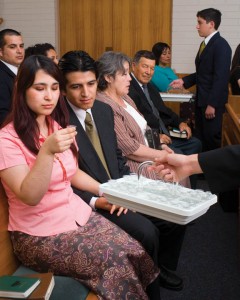|
||
Sabbath in MormonismMormonism teaches that the observance of a weekly holy day is a principle that has been in force since the foundation of the world. Genesis records that God prepared the earth over the course of six days, then blessed and sanctified the seventh day as a period of rest. Adam certainly had the law of the Sabbath, as would have all his posterity, barring times of apostasy when people turned away from the Lord’s teachings and subsequently lost divine truths and practices.
By the time Jesus lived on the earth, the Jews had invented many excessive and even arbitrary regulations in connection with Sabbath day observance. Christ saw through these senseless traditions and, though often accused of breaking the Sabbath, did in fact keep it holy always. He went about doing good, blessing the sick, teaching divine truths in holy assemblies, and being a perfect example for others to follow. Later, instead of on the seventh day, Christians began to worship Him formally on the first day of the week. This change was a result of The Council of Laodicea: In the year 364, at the Council of Laodicea, Emperor Constantine passed a law requiring that Christians must “not Judaize by resting on Saturday.” Also, the Emperor Constantine legalized Sunday as the weekly day of rest in the Roman Empire. Mormons keep the spirit of the law and respect cultural work weeks in various cultures. Sabbath meetings are held on Sunday (Saturday in Israel, Friday in Egypt, which are the traditional days of worship in those countries), during which members of the Mormon Church have the opportunity to pray together, to share knowledge and personal convictions regarding the truths of God’s plan of salvation, and to partake of the sacrament, which is what Mormons call the blessed and sanctified bread and water that represent the body and blood of Christ. Mormons are encouraged to study, ponder over, and discuss the holy scriptures including the Bible, the Book of Mormon, and others—not just in church meetings, but at home throughout the week and particularly on Sunday. Besides studying the scriptures, Mormons take advantage of the work-free Sabbath as a time to visit extended family members and the sick and elderly. It is a time of sharing love, compassion, and spiritual feelings so as to strengthen familial relationships and increase the faith of people in the Lord. Since Mormons possess the priesthood, or power and authority given of God, they are able, just like Jesus, to give blessings of healing and comfort to those who are ill or discouraged. Mormons spend the Sabbath in rest from daily labors, in worship of Heavenly Father and His Son Jesus Christ, in doing good for their own welfare as well as that of others. They strive to draw closer to God in their hearts and minds, and while doing all these good things they also abstain from doing mundane activities that might detract from the spiritual growth for which the Sabbath has been designed. Besides work, these activities include such things as shopping, going to movies, participating in sports, engaging in the use of popular media (television shows, music, etc.), and other forms of entertainment, recreation, and spending of money. While the weekdays and Saturday are an appropriate time to do these activities, Sunday is set aside as a time to take a break from the worldly and to give a break to others as well. Mormons realize that if they were to go shopping on Sunday, not only would they be breaking the Sabbath themselves but they would also be part of the cause for store workers to have to work. While there are certain professions that necessarily demand that people be available to work on Sunday—firemen and emergency medical personnel, for instance—there are still lots of businesses that could easily close down operations for a day. One example of this is a large and successful grocery store chain in Utah whose owner is Mormon. His stores are open 24 hours a day, but completely closed on Sunday. Just as the Israelites of old, customers are used to buying what they need on Saturday, knowing that there will be no “manna” on Sunday. The Bible Dictionary clearly expresses under the topic Sabbath: “. . . decay in the national religious life always follows any tendency toward carelessness in the matter of Sabbath observance. The existence of a weekly holy day is a most important safeguard; it leaves a constant reminder to the individual of his need for spiritual sustenance and his duty before God, and serves as a witness to the world that there is such a thing as revealed religion.”
|


